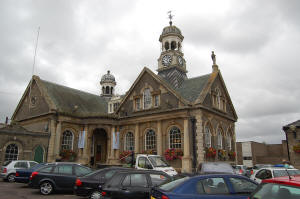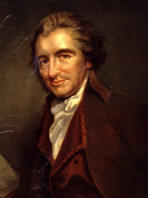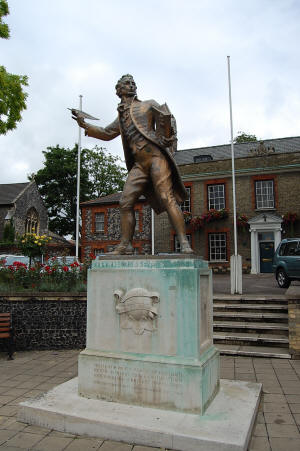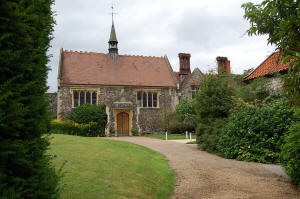|
|
|
|
Thetford
Thetford originally grew up due to its strategic
location at the point where the River Thet and
River
Little Ouse joined and the Icknield Way crossed. In its
heyday, during the 14th Century, it boasted twenty
parish churches and four monasteries. It is also
possible that Thetford was the site of Boudicca's Palace
which may have been located at Gallows Hill - just north
of the town.

Thetford Guidhall
The Grammar School - which can trace its origins back
to AD631 - has produced a number of important writers
including: Thomas Paine (see below), the Norfolk
historian Francis Blomefield and the detective writers
James Pattinson (see East
Harling) and Christopher Bush (see
Great Hockham).
Today Thetford is an
industrialised town lying in the heart of the
Brecklands. It is probably
best known for providing many of the locations for
Dad's Army -
the much-loved BBC sitcom.
Thomas Paine (1737-1809)
It is likely that Thomas Paine was born in a
room in, what is now, The Thomas Paine Hotel in White Hart
Street. He was educated at Thetford Grammar School and
then became an excise man. However, he was soon dismissed for
seeking a pay rise.

Thomas Paine
Paine emigrated to America in 1774 and two years
later published Common Sense - a demand for
American independence. He returned to England in 1787
and published The Rights of Man in response to
Burke's criticism of the French Revolution. In 1792
Paine fled to France - where he became a member of the
Convention. He was imprisoned in 1794 and completed
The Age of Reason while under threat of execution.
In 1802 he returned to American but his political
radicalism and atheism made him an outcast. He died in
America.

Statue of Thomas Paine

Thetford Grammar School
In a strange twist - William Cobbett (the
author of Rural Rides and an early opponent of
Paine) had his bones dug up
and brought back to England in order to create a proper
memorial for him. However, he mislaid them and so Paine has no known resting
place. Lord Byron wrote the following satirical poem
about this episode.
|
In digging up your bones, Tom Paine,
Will Cobbett has done well;
You visit him on earth again,
He'll visit you in hell. |
There is a magnificent statue to Paine in King Street -
just opposite The Bell Hotel. Michael Foot MP
described Paine as 'the greatest exile that has ever
left England's shores'.
The Thomas
Paine Society exists to further interest in the man
and his works. |
Robert Bloomfield (1766-1832)Robert
Bloomfield, who was born at Honington in Suffolk and
was the author of The Farmer's Boy, was familiar
with Thetford. In his poem Barnham Water - he
records a journey along the Black Bourn Valley
and mentions the town:
|
To where of old rich abbeys smil'd
In all the pomp of Gothic taste
By fond tradition proudly styl'd
The mighty 'City in the East' |
George Bloomfield (1757-1831)
Robert's elder brother George was also a poet and
wrote the following poem about Thetford:
|
|
Thetford The poets, one and all, were wont to
choose
Some fabled, fav'rite Goddess, as their
muse.
But gratitude alone my mind inspires,
No other Muse my simple pen requires.
When erst in youth's gay prime and
uncontrolled
O Thetford! round thy flow'ry fields
I've strolled,
From Tutt-Hill's eminence and Croxton's
height,
Have view'd thine ancient ruins with
delight,
Thy sloping hills and wooded vallies
gay,
Whose silv'ry Ouse meand'ring winds his
way.
Though then, each lofty mound, each
ruin'd tower,
Told but of war, and time's destructive
power;
And thou, they pristine grandeur long
had'st lost,
Nor more of Kings, or mighty chiefs
could boast;
Yet heartfelt joys beneath they roots I
found,
And peace, with all the social blessings
crown'd.
to tune his reed, and sing they healing
streams,
Then enter'd not the Bard's enraptur'd
dreams,
But now the Muse exultingly may sing,
The well attested virtues of the Spring;
Since erudition and clear truth unite
To chase all fear, and set the judgement
right.
|
However, it is hard to reconcile this picture of a rural
idyll with the Thetford of today - which is a modern,
industrialised over-spill
town. However, the centre of the town still has a number
of medieval and Georgian houses and the 'silv'ry Ouse'
still flows peacefully through it - even if there is the
odd submerged supermarket trolley.
|
|
Virginia Woolf (1882-1941) One of the town's
more exotic visitors was the novelist and diarist
Virginia Woolf. In 1906, she cycled here while staying
at nearby Blo' Norton Hall
and recorded the visit meticulously in her journal.
|
|
'The rivers Thet & Ouse (I think) circle Thetford; &
which ever way I went, seemed to take me across low
stone bridges where anglers lounged, with their rods
across the broad stream. Nurse maids were sitting on the
rivers banks, leaning on the elbow over a paper novel,
while their charges dabbled in the water. No one was
ever able to say exactly what does go on in these
medieval towns set in the heart of England at about this
hour on a Summer's afternoon.......Often in London I
shall think of Thetford, & wonder if it is still alive;
or whether it has really ceased, peaceably, to exist any
longer.' |
Links:
More Thetford photographs |
|
|
|

